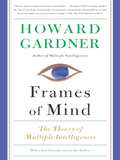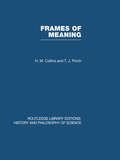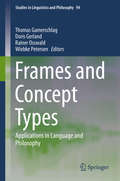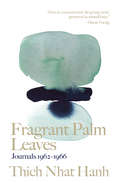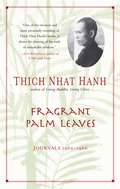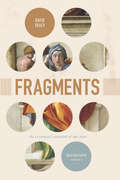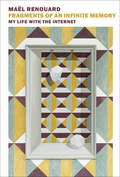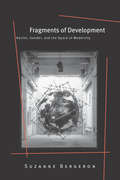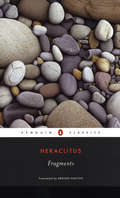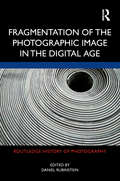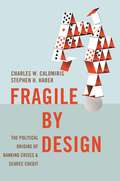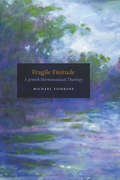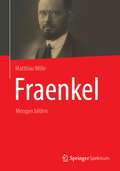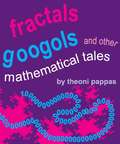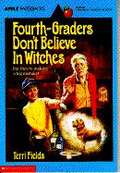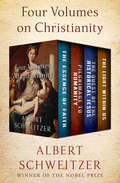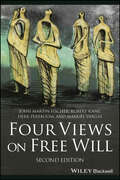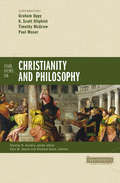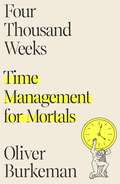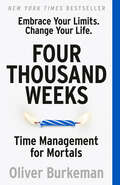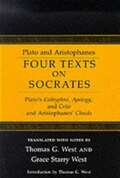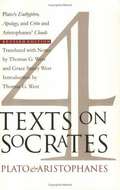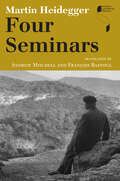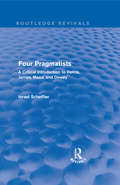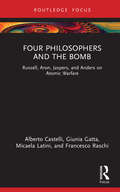- Table View
- List View
Frames of Mind: The Theory of Multiple Intelligences
by Howard GardnerFirst published in 1983 and now available with a new introduction by the author, Gardner's trailblazing book revolutionized the worlds of education and psychology by positing that rather than a single type of intelligence, we have several--most of which are neglected by standard testing and educational methods.
Frames of Meaning: The Social Construction of Extraordinary Science (Routledge Library Editions: History & Philosophy of Science)
by H M Collins & PinchOriginally published in 1982. Taking a radical interpretation of the Kuhnian concept of paradigm incommensurability, the authors begin by discussing the difficulties of gaining access to the ideas of communities with different rational categories, and then define the subject area of parapsychology, offering a review of the relevant literature. After exploring parapsychology’s compatibility with science, physics, psychology and quantum theory, the authors move on from this predominantly theoretical framework, and devote the middle section to an empirical study of metal bending. They conclude with an examination of the results, analyse diverse interpretations and investigate the consequences for the idea of scientific revolution.
Frames and Concept Types
by Thomas Gamerschlag Doris Gerland Rainer Osswald Wiebke PetersenThis volume showcases the potential richness of frame representations. The presentation includes introductory articles on the application of frames to linguistics and philosophy of science, offering readers the tools to conduct the interdisciplinary investigation of concepts that frames allow. * Introductory articles on the application of frames to linguistics and philosophy of science * Frame analysis of changes in scientific concepts * Event frames and lexical decomposition * Properties, frame attributes and adjectives * Frames in concept composition * Nominal concept types and determination "This volume deals with frame representations and their relations to concept types in linguistics and philosophy of science. It aims at reviving concepts and frames as a common model across disciplines for representing semantic and conceptual knowledge. Departing from the general assumption that frames are not just an arbitrary format of representation but essential to human cognition, a number of case studies apply frames as an analytical tool to a wide range of phenomena, from changes in scientific concepts to particular linguistic phenomena. This provides new insights into long-standing semantic issues, such as the lexical representation of verbs (as predicative frames specifying particular event descriptions or situation types and their participants), adjectives and nominals (as concept frames, which provide attributes and properties of an entity), as well as modification, complementation, possessive constructions, compounding, nominal concept types, determination, or definiteness marking. " Bert Gehrke, Pompeu, Fabra University, Barcelona, Spain
Fragrant Palm Leaves: Journals 1962-1966 (Thich Nhat Hanh Classics)
by Thich Nhat HanhRegarded by many as Thich Nhat Hanh's most personally revealing and endearing book, these collected journals chronicle the first-hand experiences of the Zen Master as a young man in both the United States and Vietnam, just as his home country is plunged into war and turmoil."It isn't likely that this collection of journal entries, which I'm calling Fragrant Palm Leaves, will pass the censors... I'll leave Vietnam tomorrow." Thus Thich Nhat Hanh begins his May 11, 1966 journal entry. After leaving Vietnam, he was exiled for calling for peace, and was unable to visit his homeland again until 2004. In the interim, Thich Nhat Hanh continued to practice and teach in the United States and Europe, and became one of the world's most respected spiritual leaders. But when these journals are written, all of that is still to come. Fragrant Palm Leaves reveals a vulnerable and questioning young man, a student and teaching assistant at Princeton and Columbia Universities from 1962-1963, homesick and reflecting on the many difficulties he and his fellow monks faced at home trying to make Buddhism relevant to the people's needs. We also follow Thich Nhat Hanh as he returns to Vietnam in 1964, and helps establish the movement known as Engaged Buddhism.A rare window into the early life of a spiritual icon, Fragrant Palm Leaves provides a model of how to live fully, with awareness, during a time of change and upheaval.
Fragrant Palm Leaves
by Hanh Thich Nhat'It isn't likely that this collection of journal entries will pass the censors. If it can't be published, I hope my friends will circulate it among themselves. I'll leave Vietnam tomorrow. . . ' Thus Thich Nhat Hanh begins his 11 May 1966 journal entry. Since that time, he has been unable to return to his homeland but, now based in France, he has become one of the world's most respected spiritual leaders. Fragrant Palm Leaves reveals a vulnerable and questioning young man reflecting on the many difficulties he and his fellow monks faced in Vietnam trying to make Buddhism relevant to the people's needs. We follow him, in 1964, as he helps establish the movement known as 'engaged Buddhism': starting self-help villages, a new university, a Buddhist order and many other efforts for peace. Fragrant Palm Leaves is regarded by many Vietnamese as Thich Nhat Hanh's most endearing and stimulating book. It offers readers a glimpse into the mind of a great thinker and activist and shows how to live fully, with awareness, during a time of challenge and upheaval.
Fragments: The Existential Situation of Our Time: Selected Essays, Volume 1
by David TracyDavid Tracy is widely considered one of the most important religious thinkers in North America, known for his pluralistic vision and disciplinary breadth. His first book in more than twenty years reflects Tracy’s range and erudition, collecting essays from the 1980s to 2018 into a two-volume work that will be greeted with joy by his admirers and praise from new readers. In the first volume, Fragments, Tracy gathers his most important essays on broad theological questions, beginning with the problem of suffering across Greek tragedy, Christianity, and Buddhism. The volume goes on to address the Infinite, and the many attempts to categorize and name it by Plato, Aristotle, Rilke, Heidegger, and others. In the remaining essays, he reflects on questions of the invisible, contemplation, hermeneutics, and public theology. Throughout, Tracy evokes the potential of fragments (understood both as concepts and events) to shatter closed systems and open us to difference and Infinity. Covering science, literature, philosophy, psychoanalysis, and non-Western religious traditions, Tracy provides in Fragments a guide for any open reader to rethink our fragmenting contemporary culture.
Fragments of an Infinite Memory: My Life with the Internet
by Mael RenouardA deeply informed, yet playful and ironic look at how the internet has changed human experience, memory, and our sense of self, and that belongs on the shelf with the best writings of Roland Barthes and Jean Baudrillard.&“One day, as I was daydreaming on the boulevard Beaumarchais, I had the idea—it came and went in a flash, almost in spite of myself—of Googling to find out what I&’d been up to and where I&’d been two evenings before, at five o&’clock, since I couldn&’t remember on my own.&” So begins Maël Renouard&’s Fragments of an Infinite Memory, a provocative and elegant inquiry into life in a wireless world. Renouard is old enough to remember life before the internet but young enough to have fully accommodated his life to the internet and the gadgets that support it. Here this young philosopher, novelist, and translator tries out a series of conjectures on how human experience, especially the sense of self, is being changed by our continual engagement with a memory that is impersonal and effectively boundless. Renouard has written a book that is rigorously impressionistic, deeply informed historically and culturally, but is also playful, ironic, personal, and formally adventurous, a book that withstands comparison to the best of Roland Barthes and Jean Baudrillard.
Fragments of Development: Nation, Gender, and The Space of Modernity
by Suzanne Bergeron"A bold and challenging consideration of questions of development, economic globalization, communities and subjectivity from a unique feminist perspective. A must-read book for those who wish to understand restructuring and resistance in this era of intensified globalization. " ---Isabella C. Bakker, York University "Bergeron's pathbreaking analysis challenges orthodox development theories, questions current feminist economic thinking and highlights crucial new gendered challenges to globalization. " ---Jane Parpart, Dalhousie University "Cutting-edge scholarship. Bergeron deftly engages the complexity of current debates while retaining clarity, improving analyses, and illuminating alternatives. " ---V. S. Peterson, University of Arizona By tracing out the intersection between the imagined space of the national economy and the gendered construction of "expert" knowledge in development thought, Suzanne Bergeron provides a provocative analysis of development discourse and practice. By elaborating a framework of including/excluding economic subjects and activities in development economics, she provides a rich account of the role that economists have played in framing the contested political and cultural space of development. Bergeron's account of the construction of the national economy as an object of development policy follows its shifting meanings through modernization and growth models, dependency theory, structural adjustment, and contemporary debates about globalization and highlights how intersections of nation and economy are based on gendered and colonial scripts. The author's analysis of development debates effectively demonstrates that critics of development who ignore economists' nation stories may actually bolster the formation they are attempting to subvert. Fragments of Developmentis essential reading for those interested in development studies, feminist economics, international political economy, and globalization studies.
Fragments
by James Hillman Brooks Haxton HeraclitusIn the sixth century b.c.-twenty-five hundred years before Einstein-Heraclitus of Ephesus declared that energy is the essence of matter, that everything becomes energy in flux, in relativity. His great book, On Nature, the world's first coherent philosophical treatise and touchstone for Plato, Aristotle, and Marcus Aurelius, has long been lost to history-but its surviving fragments have for thousands of years tantalized our greatest thinkers, from Montaigne to Nietzsche, Heidegger to Jung. Now, acclaimed poet Brooks Haxton presents a powerful free-verse translation of all 130 surviving fragments of the teachings of Heraclitus, with the ancient Greek originals beautifully reproduced en face.
Fragmentation of the Photographic Image in the Digital Age (Routledge History of Photography)
by Daniel RubinsteinFragmentation of the Photographic Image in the Digital Age challenges orthodoxies of photographic theory and practice. Beyond understanding the image as a static representation of reality, it shows photography as a linchpin of dynamic developments in augmented intelligence, neuroscience, critical theory, and cybernetic cultures. Through essays by leading philosophers, political theorists, software artists, media researchers, curators, and experimental programmers, photography emerges not as a mimetic or a recording device but simultaneously as a new type of critical discipline and a new art form that stands at the crossroads of visual art, contemporary philosophy, and digital technologies.
Fragile by Design: The Political Origins of Banking Crises and Scarce Credit (The Princeton Economic History of the Western World #50)
by Charles W. Calomiris Stephen HaberWhy stable banking systems are so rareWhy are banking systems unstable in so many countries—but not in others? The United States has had twelve systemic banking crises since 1840, while Canada has had none. The banking systems of Mexico and Brazil have not only been crisis prone but have provided miniscule amounts of credit to business enterprises and households.Analyzing the political and banking history of the United Kingdom, the United States, Canada, Mexico, and Brazil through several centuries, Fragile by Design demonstrates that chronic banking crises and scarce credit are not accidents. Calomiris and Haber combine political history and economics to examine how coalitions of politicians, bankers, and other interest groups form, why they endure, and how they generate policies that determine who gets to be a banker, who has access to credit, and who pays for bank bailouts and rescues.Fragile by Design is a revealing exploration of the ways that politics inevitably intrudes into bank regulation.
Fragile Finitude: A Jewish Hermeneutical Theology
by Michael FishbaneThe world we engage with is a vibrant collage brought to consciousness by language and our creative imagination. It is through the symbolic forms of language that the human world of value is revealed—this is where religious scholar Michael Fishbane dwells in his latest contribution to Jewish thought. In Fragile Finitude, Fishbane clears new ground for a theological life through a novel reinterpretation of the Book of Job. On this basis, he offers a contemporary engagement with the four classical types of Jewish Scriptural exegesis. The first focuses on worldly experience, the second on communal forms of practice and thought in the rabbinical tradition, the third on personal development, and the fourth on transcendent, cosmic orientations. Through these four modes, Fishbane manages to transform Jewish theology from within, at once reinvigorating a long tradition and moving beyond it. What he offers is nothing short of a way to reorient our lives in relation to the divine and our fellow humans. Written from within the Jewish tradition, Fragile Finitude is intended for readers across the religious spectrum.
Fraenkel: Mengen bilden
by Matthias WilleErleben Sie das Wiedererwachen des universitären Lebens nach 1918 aus der Sicht eines Betroffenen. Tauchen Sie ein in die Erziehungs- und Sozialgeschichte der Mathematik zur Zeit der Weimarer Republik und erfahren aus der Perspektive eines jungen Autors das Aufstreben der Firma von Julius Springer zum führenden Mathematikverlag. Dank der Verwendung einer Vielzahl von unveröffentlichten Quellen erhalten Sie einen überaus facettenreichen Eindruck des zeitgenössischen akademischen Milieus. In dieser weltweit ersten umfassenden Studie zu Abraham Adolf Fraenkel werden Ihnen bis dato vollkommen unbekannte Einblicke in die Werkstatt seiner mathematischen Gedanken geboten, die verständlich machen, wie innerhalb kürzester Zeit aus einem Laien ein international renommierter Experte für Mengenlehre wurde. Minutiös wird rekonstruiert, wie er vor exakt 100 Jahren zu seinen wegweisenden Resultaten gelangte, die schließlich zum unaufhaltsamen Aufstieg des modernen mengentheoretischen Paradigmas führten.
Fractals, Googols, and Other Mathematical Tales
by Theoni PappasA treasure trove of stories that make mathematical ideas come to life. Explores math concepts and topics such as real numbers, exponents, dimensions, the golden rectangle in both serious and humorous ways. Stories such as the parable of p, the number line that fell apart, Leonhard the magic turtle and many others offer an amusing and entertaining way to explore and share mathematical ideas regardless of age or background. The reference section following each story is designed as enrichment information for the concepts presented in each story.
Fourth Graders Don't Believe in Witches
by Terri FieldsMrs. Mullins told Allan she's a witch. But Allan thinks witches are not real and Mrs. Mullins is definitely real, yet she is a witch. Somehow it did not add up.
Four Volumes on Christianity: The Essence of Faith, Pilgrimage to Humanity, The Quest of the Historical Jesus, and The Light Within Us
by Albert SchweitzerFour of the Nobel Peace Prize–winning author&’s most influential, insightful, and inspiring works on theology and ethics in the modern world. Famous for founding the Albert Schweitzer Hospital in what is now the West African country of Gabon, Albert Schweitzer&’s ethical philosophy of &“Reverence for Life&” became one of the most influential ideas of the twentieth century. These four volumes chart the development of Schweitzer&’s philosophy from his student days to his career as a globally revered intellectual. The Essence of Faith: While studying for his PhD at the Sorbonne, Schweitzer developed his views on theology through an analysis of Immanuel Kant&’s philosophy of religion. In The Essence of Faith, Schweitzer explores Kantian ideas to arrive at an inspiring meditation on God, faith, and the limits of human understanding. Pilgrimage to Humanity: In Pilgrimage to Humanity, Schweitzer discusses his philosophy, his ministry in Africa, and his pursuit of world peace. He also explores the important contributions to civilization made by figures such as Johann Wolfgang von Goethe, J. S. Bach, and Jesus of Nazareth. The Quest of the Historical Jesus: In this landmark work of Biblical criticism, Schweitzer deconstructs the traditional myths of Jesus&’s life by offering rigorous textual analysis and historical evidence. By establishing the social and political climate of Jesus&’s time, Schweitzer not only dismantles the previously dominant images of Jesus, but also presents a compelling new theory of his own. The Light Within Us: In The Light Within Us, Schweitzer&’s longtime friend Richard Kik has compiled many of his most insightful and inspiring quotations. Drawn from his many writings, these quotations share Schweitzer&’s thoughts on service, gratitude, God, missionary work, and much more.
Four Views on Free Will (Great Debates in Philosophy)
by Robert Kane Derk Pereboom John Martin Fischer Manuel VargasA lively and engaging debate between four representative views on free will, completely revised and updated with new perspectives Four Views on Free Will is a robust and careful debate about free will, how it interacts with determinism and indeterminism, and whether we have it or not. Providing the most up-to-date account of four major positions in the free will debate, the second edition of this classic text presents the opposing perspectives of renowned philosophers John Martin Fischer, Robert Kane, Derk Pereboom, and Manuel Vargas. Substantially revised throughout, this new volume contains eight in-depth chapters, almost entirely rewritten for the new edition, in which the authors state their different positions on the debate, offer insights into how their views have evolved over the past fifteen years, respond to recent critical literature in the field, and interact and engage with each other in dialogue. In the first four chapters the authors defend their distinctive views about free will: libertarianism, compatibilism, hard incompatibilism, and revisionism. The subsequent four chapters consist of direct replies by each of the authors to the other three. Offering a one-of-a-kind interactive conversation about the most recent work on the subject, Four Views on Free Will, Second Edition provides a balanced and enlightening discussion on all the key concepts and conflicts in the free will debate. Part of the acclaimed Great Debates in Philosophy series, it remains essential reading for undergraduate and graduate students, lecturers and scholars in philosophy, ethics, free will, philosophy of mind, political philosophy, law, and related subjects.
Four Views on Christianity and Philosophy
by K. Scott Oliphint Stanley N. Gundry Richard Brian Davis Paul Moser Graham Oppy Paul M. Gould Timothy McgrewPhilosophy and Christianity make truth claims about many of the same things. They both claim to provide answers to the deep questions of life. But how are they related to one another? Four Views on Christianity and Philosophy introduces readers to four predominant views on the relationship between philosophy and the Christian faith and their implications for life. Each author identifies the propositional relation between philosophy and Christianity along with a section devoted to the implications for living a life devoted to the pursuit of wisdom.The contributors and views include:Graham Oppy—Conflict: Philosophy Trumps ChristianityK. Scott Oliphint—Covenant: Christianity Trumps PhilosophyTimothy McGrew—Convergence: Philosophy Confirms ChristianityPaul Moser—Conformation: Philosophy Reconceived Under ChristianityGeneral editors Paul M. Gould and Richard Davis explain the background to the discussion and provide some historical background in the introduction, as well as helpful summaries of each position in the conclusion. In the reader-friendly Counterpoints format, this book helps readers to reflect on the strengths and weaknesses of each view and draw informed conclusions in this much-debated topic.
Four Thousand Weeks: Time Management for Mortals
by Oliver BurkemanAN INSTANT NEW YORK TIMES BESTSELLER"Provocative and appealing . . . well worth your extremely limited time." —Barbara Spindel, The Wall Street JournalThe average human lifespan is absurdly, insultingly brief. Assuming you live to be eighty, you have just over four thousand weeks.Nobody needs telling there isn’t enough time. We’re obsessed with our lengthening to-do lists, our overfilled inboxes, work-life balance, and the ceaseless battle against distraction; and we’re deluged with advice on becoming more productive and efficient, and “life hacks” to optimize our days. But such techniques often end up making things worse. The sense of anxious hurry grows more intense, and still the most meaningful parts of life seem to lie just beyond the horizon. Still, we rarely make the connection between our daily struggles with time and the ultimate time management problem: the challenge of how best to use our four thousand weeks.Drawing on the insights of both ancient and contemporary philosophers, psychologists, and spiritual teachers, Oliver Burkeman delivers an entertaining, humorous, practical, and ultimately profound guide to time and time management. Rejecting the futile modern fixation on “getting everything done,” Four Thousand Weeks introduces readers to tools for constructing a meaningful life by embracing finitude, showing how many of the unhelpful ways we’ve come to think about time aren’t inescapable, unchanging truths, but choices we’ve made as individuals and as a society—and that we could do things differently.
Four Thousand Weeks: Time Management for Mortals
by Oliver Burkeman&“This is the most important book ever written about time management. Oliver Burkeman offers a searing indictment of productivity hacking and profound insights on how to make the best use of our scarcest, most precious resource. His writing will challenge you to rethink many of your beliefs about getting things done-and you&’ll be wiser because of it.&” -Adam Grant, #1 New York Times bestselling author of Think Again and host of WorkLife Time is our biggest worry: there is too little of it. The award-winning, renowned Guardian columnist Oliver Burkeman offers a lively, entertaining philosophical guide to time and time management, setting aside superficial efficiency solutions in favour of reckoning with and finding joy in the finitude of human life.The average human lifespan is absurdly, insultingly brief. Assuming you live to be eighty, you have just over four thousand weeks.Nobody needs telling there isn't enough time. We're obsessed with our lengthening to-do lists, our overfilled inboxes, work-life balance, and the ceaseless struggle against distraction; and we're deluged with advice on becoming more productive and efficient, plus "lifehacks" to optimize our days. But such techniques often just end up making things worse. The sense of anxious hurry grows more intense, and still the most meaningful parts of life seem to lie just beyond the horizon. Still, we rarely make the connection between our daily struggles with time and the ultimate time management problem: the challenge of how best to use our four thousand weeks.Drawing on the insights of ancient and contemporary philosophers, psychologists, and spiritual teachers, Oliver Burkeman delivers an entertaining, humorous, practical, and ultimately profound guide to time and time management. Rejecting the futile modern obsession with "getting everything done," he introduces readers to tools for constructing a meaningful life, showing how many of the unhelpful ways we've come to think about time aren't inescapable, unchanging truths, but choices we've made, as individuals and as a society--and that we could do things differently.
Four Texts on Socrates: Plato's Euthyphro, Apology, and Crito and Aristophanes' Clouds
by Thomas G. West Grace S. WestWidely adopted for classroom use, this book offers translations of four major works of ancient Greek literature which treat the life and thought of Socrates, focusing particularly on his trial and defense (three dialogues by Plato: Euthyphro, Apology of Socrates, and Crito) and on the charges against Socrates (Aristophanes' comedy Clouds). <p><p> This is the only collection of the three Platonic dialogues that also includes Clouds, a work that is fundamental for understanding the thought of Socrates in relation to the Athenian political community and to Greek poetry. Thomas G. West's introduction provides an overview of the principal themes and arguments of the four works. There are extensive explanatory notes to the translations. In their translations, the Wests capture successfully the simplicity and vigor of straightforward Greek diction. They strive for as high a degree of accuracy as possible, subordinating concerns for elegance and smoothness to the goal of producing the most faithful and most reliable English versions of these texts. <p><p> For this new edition, Thomas West has revised the introduction and updated the annotated bibliography, which includes the best of the secondary literature on Socrates and on the texts included in this book.
Four Texts on Socrates: Plato's Euthyphro, Apology and Crito, and Aristophanes' Clouds (Revised Edition)
by Plato Aristophanes Thomas G. West Grace S. WestWidely adopted for classroom use, this book offers translations of four major works of ancient Greek literature which treat the life and thought of Socrates, focusing particularly on his trial and defense (the platonic dialogues Euthyphro, Apology of Socrates, and Crito) and on the charges against Socrates (Aristophanes' comedy Clouds). This is the only collection of the three Platonic dialogues that also includes Clouds, a work that is fundamental for understanding the thought of Socrates in relation to the Athenian political community and to Greek poetry. Thomas G. West's introduction provides an overview of the principal themes and arguments of the four works. There are extensive explanatory notes to the translations. For this new edition, Thomas West has revised the introduction and updated the annotated bibliography, which includes the best of the secondary literature on Socrates and on the texts included in this book. In their translations, the Wests capture successfully the simplicity and vigor of straightforward Greek diction. They strive for as high a degree of accuracy as possible, subordinating concerns for elegance and smoothness to the goal of producing the most faithful and most reliable English versions of these texts.
Four Seminars (Studies in Continental Thought)
by Martin HeideggerThe philosopher presents a stimulating overview of his work, its intellectual roots, and its relationship to the work of other twentieth century thinkers.In Four Seminars, Heidegger reviews the entire trajectory of his thought and offers unique perspectives on fundamental aspects of his work. First published in French in 1976, these seminars were translated into German with Heidegger’s approval and reissued in 1986 as part of his Gesamtausgabe, volume 15. Topics considered include the Greek understanding of presence, the ontological difference, the notion of system in German Idealism, the power of naming, the problem of technology, danger, and the event.Heidegger’s engagements with his philosophical forebears—Parmenides, Heraclitus, Kant, and Hegel—continue in surprising dialogues with his contemporaries—Husserl, Marx, and Wittgenstein. While providing important insights into how Heidegger conducted his lectures, these seminars show him in his maturity, reflecting back on his philosophical path.
Four Pragmatists: A Critical Introduction to Peirce, James, Mead, and Dewey (Routledge Revivals)
by Israel SchefflerFirst published in 1974, this book is a critical introduction to the work of four quintessential pragmatist philosophers: Charles Sanders Peirce, William James, George Herbert Mead and John Dewey. Alongside providing a general historical and biographical account of the pragmatist movement, the work offers an in depth critical response to the philosophical doctrines of the four main thinkers of the pragmatist movement, with reference to the theories of meaning, knowledge and conduct which have come to define pragmatism.
Four Philosophers and the Bomb: Russell, Aron, Jaspers, and Anders on Atomic Warfare (Routledge Studies in Social and Political Thought)
by Alberto Castelli Giunia Gatta Micaela Latini Francesco RaschiIn this book, Alberto Castelli, Giunia Gatta, Micaela Latini, and Francesco Raschi examine how four prominent intellectuals of the 20th century (Bertrand Russell, Karl Jaspers, Raymond Aron, and Günther Anders) understood atomic warfare. With a chapter devoted to the philosophical ideas of each thinker and how they understood and interpreted war, the authors analyze the historic-political context in which these ideas emerged and what they proposed to avoid a nuclear disaster.Four Philosophers and the Bomb will be of interest to students and researchers of peace studies, international relations, political philosophy, and moral philosophy.
